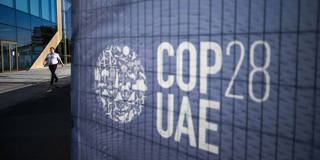Committed global action at every level of government, the economy, and society is needed to tackle such a complex, multifaceted challenge, and a growing awareness that time is running out should help to foster it at the UN Climate Change Conference in Dubai. But the real test will come after, when promises must be kept.
MILAN – This year’s United Nations Climate Change Conference (COP28) has begun in Dubai. Depending on whom you ask, the outlook ranges from deeply pessimistic to cautiously optimistic. But there is one thing on which almost everyone agrees: effective climate action is more urgent than ever.
This shared sense of urgency at COP28 is crucial. Some 70,000 delegates – including representatives of all parties to the UN Framework Convention on Climate Change, and a range of other stakeholders, from business leaders to climate scientists – are expected to participate. Such a vast and varied group might be unwieldy, but broad engagement – which has been on the rise in recent years – is vital to progress. Committed global action at every level of government, the economy, and society is needed to tackle such a complex, multifaceted challenge, and a growing awareness that time is running out should help to foster it.
While broad-based action is critical, however, the fact is that just a few key actors have the power to bring about a radical reduction in global emissions. More than 60% of all greenhouse-gas emissions are produced by just six economies: China, the United States, India, the European Union, Russia, and Brazil (in order of total emissions). They must take the lead not only on reducing their own emissions, but also on advancing the development and diffusion of renewables and other technologies needed for the global energy transition.

MILAN – This year’s United Nations Climate Change Conference (COP28) has begun in Dubai. Depending on whom you ask, the outlook ranges from deeply pessimistic to cautiously optimistic. But there is one thing on which almost everyone agrees: effective climate action is more urgent than ever.
This shared sense of urgency at COP28 is crucial. Some 70,000 delegates – including representatives of all parties to the UN Framework Convention on Climate Change, and a range of other stakeholders, from business leaders to climate scientists – are expected to participate. Such a vast and varied group might be unwieldy, but broad engagement – which has been on the rise in recent years – is vital to progress. Committed global action at every level of government, the economy, and society is needed to tackle such a complex, multifaceted challenge, and a growing awareness that time is running out should help to foster it.
While broad-based action is critical, however, the fact is that just a few key actors have the power to bring about a radical reduction in global emissions. More than 60% of all greenhouse-gas emissions are produced by just six economies: China, the United States, India, the European Union, Russia, and Brazil (in order of total emissions). They must take the lead not only on reducing their own emissions, but also on advancing the development and diffusion of renewables and other technologies needed for the global energy transition.